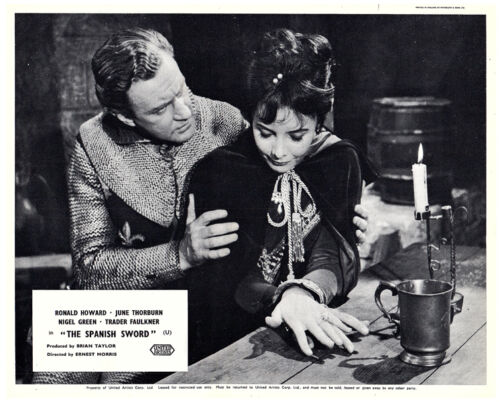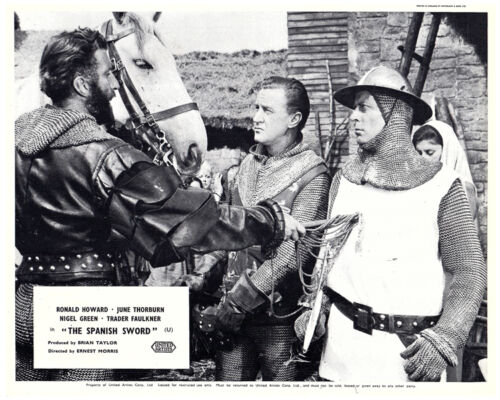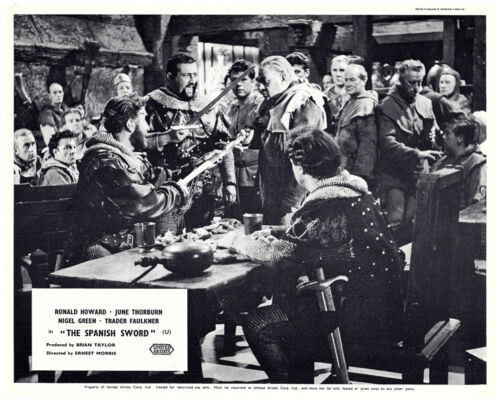
ABOVE = Ronald Howard comforts June Thorburn in a scene from the film
Great Britain’s Danziger Brothers–were responsible for this film.

“The Spanish Sword” is quite a slow-moving story of a knight who tries to thwart the plans of a greedy baron. This is not one of writer Brian Clemens’ finest hours, to say the least–his script is cliché-ridden – as someone once said but not of this one that the scriptwriters threw every cliché in the book at the audience and they threw them back’
Having said that when we went to the Cinema in those days, we weren’t too bothered about the script but just wanted a good story and plenty of action
Film Director Ernest Morris does his best within the short time he has to tell the story after all this was a supporting film with a running time of 62 minutes. I have a feeling that if I had seen this at the cinema I would have enjoyed it.

Nigel Green played the villain and was able to give us some good moments
Star Ronald Howard looks a little lost but battled away
Leading lady June Thorburn – she always looked pretty and was a great addition to the cast.

| Director: Ernest Morris Writer: Brian Clemens (story) Stars: Ronald Howard, June Thorburn, Nigel Green, Trader Faulkner, Robin Hunter, Derrick Sherwin |
| The British actor Ronald Howard was born in Norwood, London, England, in 1918. After college, Howard became a newspaper reporter for a while but decided to follow in his father’s footsteps and become an actor. He got his first taste of acting when he appeared with his father in an uncredited bit part in ‘Pimpernel’ Smith (1941). In the early 1940s, Howard gained acting experience in regional theatre, later on the London stage, and eventually in films, with his official debut in While the Sun Shines (1947). His chief claim to fame is in television with his portrayal of Sherlock Holmes in the series Sherlock Holmes (1954), in which Howard Marion-Crawford played Dr. Watson. Boyishly handsome with a pleasant peronality, Ronald Howard continued in film and television until the mid-1970s; however, he never caught on with audiences as well as his father had, prompting him to put aside his acting career to run an art gallery. In the 1980s, he wrote a biography of his father. |
J
The character actor Nigel Green, born in Pretoria, South Africa, in 1924, was educated in England and studied chemical engineering before winning a scholarship to the Royal Academy of Dramatic Art in London. By age 24, he was appearing on stage at both the Old Vic and Stratford-on-Avon, and in the early 1950s, he made his film and television debuts. In 1956, he received serious injuries in an accident, but he fully recovered and established himself as a familiar figure in British film and television. His forceful, dominant manner inevitably led Green to military and authoritarian roles throughout his career while his tall, muscular physique was appropriate for playing such characters as Fertog “The Bear” in the television series William Tell (1958), Little John in Sword of Sherwood Forest (1960), and Hercules in Jason and the Argonauts (1963). Green had a number of small film roles in the early 1960s until his appearance in the critically acclaimed Zulu (1964), after which his film roles improved. Perhaps his best-known performance is that of Michael Caine ‘s superior in the stylish spy film The Ipcress File (1965). In addition to a few British horror films, such as The Skull (1965), The Face of Fu Manchu (1965), and Countess Dracula (1971), Green also appeared in a number of Hollywood films, including Tobruk (1967), The Wrecking Crew (1968) and The Kremlin Letter (1970). Green’s later films brought him international recognition and a chance at stardom; however, his career was brought to an abrupt end by his sudden death in 1972 at age 47 from an accidental overdose of sleeping pills.
… [Trackback]
[…] There you will find 88497 additional Info to that Topic: filmsofthefifties.com/the-spanish-sword-1952-ronald-howard-and-june-thorburn/ […]
… [Trackback]
[…] There you can find 71710 more Information on that Topic: filmsofthefifties.com/the-spanish-sword-1952-ronald-howard-and-june-thorburn/ […]